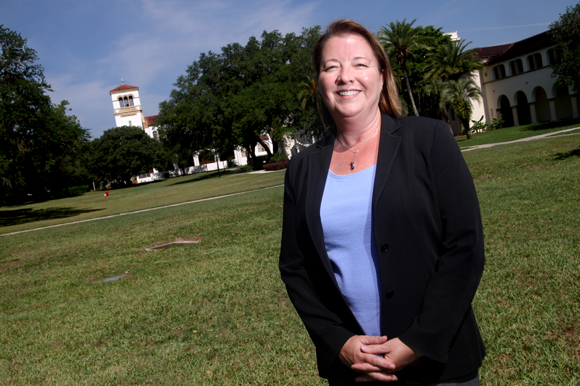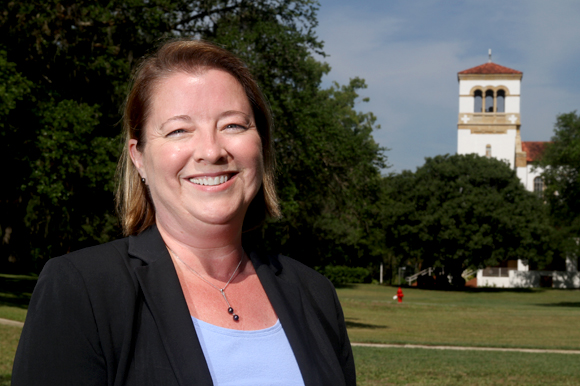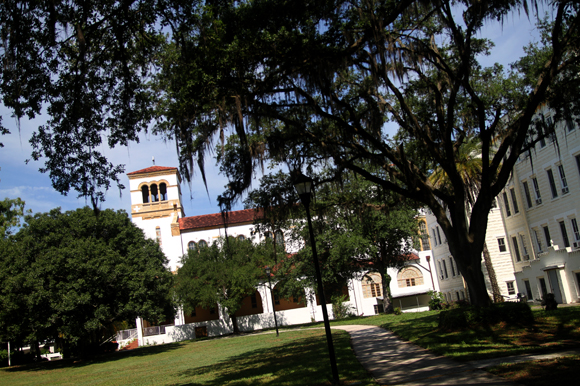Q&A: Susan Colaric, Saint Leo University
Tiny Saint Leo University, situated about 35 minutes north of Tampa in idyllic central Pasco County, stays connected to faraway students in countries around the globe using the latest in online technology.
A pioneer in educating military personnel stationed abroad, Saint Leo University’s Department of Instructional Technology enables the private college to offer more than 200 courses onine.
Director Susan Colaric talks with 83 Degrees about the department’s successes and what the future may hold in online learning.
83D: What are the traits of a student who learns well online?
SC: Part of the formula for success is setting regular patterns or processes for every class. Discussion posts are due every Thursday. Class assignments are due on Sundays. That structure helps the students because they can spend their time learning rather than figuring out when something is due; they can focus on the content of the assignment rather than on where to find the assignment.
83D: What should a potential student consider in deciding whether to take a course online?
SC: Most of our online students are working adults. We encourage them to be open about sharing their experiences and try to teach them how to use their work experience in learning new things. We can help them see how the practices they already do have solid research behind them. Knowing that helps move them to the next level.
83D: How is online learning different?
A: You can’t hide in an online classroom. In a huge classroom setting with a professor, it’s easy to slink down in your seat and never get called upon for an answer. In online classes, every student is expected to answer every question. Lots of students fail to recognize that until they get into class and realize that they are required to participate in discussion boards and complete assignments on time.
83D: What are some of the challenges with online learning? For students? For faculty?
SC: Time management is a big issue for both. Students have the expectation that because you’re online, you’re always available. They think, “I submitted something yesterday, why isn’t it graded yet?” Structure and process can help both faculty and students. If both know going in that papers are graded on Monday nights, that becomes the expectation. Students know they must submit their work on Sundays. Faculty know they must grade on Mondays.
It’s also important for faculty to know that not everything has to be online. In a criminal justice class, for instance, students have to purchase a forensic kit. They do fingerprints, make plaster of Paris casts of footprints, etc. They have to do it on their own and faculty has to find ways to help them submit the results. Take a picture of what you did. Do video. Capture the audio. Faculty and students have to get creative to describe what they did and what they learned.
83D: What’s an advantage of learning online?
SC: Students can review multiple times. In a traditional classroom, something may be done once in front of the classroom. If you’re not there or not paying attention, you’ve missed it. Online, you can watch it again and again until you really understand.
83D: If you could throw an unsolved problem out there for discussion in an open source environment, what would it be?
SC: Learning management systems are a real problem. Blackboard has pretty much bought all the competitors. They own close to 90 percent of the market now. When someone has that much of the market, customer service can sometimes be an issue. We’re struggling a bit now in our transfer to Blackboard. We use eCollege for most online products. It’s a Pearson product. Moving to Blackboard is a little harder, less intuitive. It may be good for supporting classes, but it’s not so good for completely online courses. Blackboard’s market dominence is a question going forward. It means no control over pricing for the college customer. There are some open source choices out there, such as Moodle, but a college needs a technical department to support that. If something’s not working, who do you call if it’s open source? If students get stuck and put a question out there in an open source environment, there is no guarantee that they’ll get an answer. It’s so-not-seamless yet.
83D: What are examples of instructional technology in the classroom?
SC: Right now there are a couple of versions of technology that showcase the iPad. And there’s a new clicker technology. Students can respond to questions with a clicker. Their answers can be recorded. We also have a new one testing for web conferencing centers. When we have students in Georgia, Virginia and Texas and a faculty member in Key West, communications can be instantaneous by working off of satellites. We have 25 flip video cameras that faculty can check out.
83D: Wow me? What’s the latest, greatest technology?
SC: There’s nothing that anyone sees on the horizon that would be a game changer. eBooks are out there and great for pleasure reading, but textbooks aren’t there yet. Kindles don’t do charts and graphs well. iPads don’t use enough technologies yet. They won’t run Flash. Won’t run Captivate. It doesn’t recognize a text block. We’re using Elluminate, a virtual office. Students can log in at 7 on Monday nights to listen to me, see me, talk to me, have a discussion. In May, faculty used more than 800 hours.
83D: What’s the next great thing in online learning?
SC: We do a lot with HD versions of web conferencing. In experimenting with holograms, we can actually beam a faculty member to another location. I was recently at a conference where the keynote speaker wasn’t there but he looked like he was there. The technology was set up so his image was in front of the audience. A camera was also set up to see the audience. So he could call on the woman in the audience wearing a green shirt even though he wasn’t there. The technology uses mirrors and cameras. There’s a certain “wow” factor, but does it enhance learning? After 10 minutes of “wow,” what else is there? We’re more interested in how it helps learning than that it exists.
83D: What will the classroom of the future look like?
SC: Every class is going to have a much more technology enhanced environment. Virtual schools will allow students in rural or remote areas to take classes in urban settings. There will be so many opportunities for connecting with other cultures. At Pasco Middle School, we provided the web technology and support so they could have a sister school in China. Students were reading the same books, and discussing them together online. It’s a great opportunity for kids to see how different people are but also how much they’re alike as well.
Right now 600 or 700 Saint Leo students are deployed in Iraq and Afghanistan. Last year we brought a student in Iraq into Saint Leo on screen so he could graduate with his class as if he were here. We recently opened in San Diego. The Air Force asked us to move into a base in Mississippi. We give students the opportunity to go to class on site or through video conferencing. Faculty can be in different locations. We help small military sites have academic programs that they couldn’t otherwise offer.
83D: Any other points you wanted to make?
SC: We don’t look at technology for the sake of technology, but offer it as a way for students to learn if they’re unable to come to campus. What we offer online is a matter of looking to students and seeing their needs and then developing classes to go with it.
Diane Egner, 83 Degrees publisher and managing editor, shares insights from thought leaders by conducting interviews and editing their answers for succinctness. Comments? Contact 83 Degrees.

















